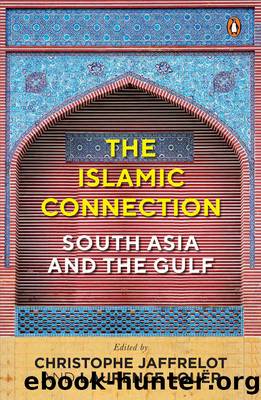The Islamic Connection by Jaffrelot Christophe & Louër Laurence

Author:Jaffrelot, Christophe & Louër, Laurence [Jaffrelot, Christophe]
Language: eng
Format: epub
ISBN: 9789387326484
Publisher: Penguin Random House India Private Limited
Published: 2017-12-10T16:00:00+00:00
Conclusion
The Gulf monarchies were dragged into the post-2001 Afghan conflict by their Pakistani allies, who needed financial support for their campaign to reclaim their âfair shareâ of influence in what they perceived was an Afghanistan under growing Indian hegemony. As a result, for several years the Gulf monarchies and particularly the Saudis spent tens of millions of dollars a year, but maintained only very low level direct influence on the Taliban. Still, some of the purported aims of the Taliban insurgency, or its direct consequences, suited the Gulf monarchies well. Buying influence among the Taliban was consistent with Saudi and Qatari practices of trying to influence radical Islamic movements with financial support. More importantly, a growing Taliban insurgency was assumed to be harming Iranian interests in Afghanistan. If the Pakistanis saw an emerging Indian hegemony in Afghanistan, the Gulf monarchies saw an emerging Iranian hegemony. True, supporting insurgents in Afghanistan was harming traditional allies of the Gulf monarchies, such as the US and Great Britain, but after all these two powers were seen as responsible in Afghanistan, as they had been in Iraq, of irresponsibly allowing for greater Iranian influence.
As the conflict dragged on, the Gulf monarchies started developing Taliban policies of their own, and got directly engaged with the Taliban, bypassing the Pakistanis. One reason for not fully trusting the Pakistanis was the latterâs efforts to find a modus vivendi with the Iranians, both in terms of developing a reconciliation model which allowed traditional Iranian allies in Afghanistan to play a role, and in terms of tolerating Iranian efforts to buy influence within the Taliban. The Pakistanis could not afford a hostile Iran, given that they share a border with it and given the large Shiâa minority inside Pakistan. As the âcold warâ between the Gulf monarchies and Iran escalated from 2013 onwards, the Saudis and to a lesser extent the Qataris had less and less patience with Pakistani concerns.
The Qataris were the first to break loose, launching the now famous âQatar trackâ of Taliban-Kabul reconciliation. This effort was not appreciated by the Pakistanis, who thought it premature and most importantly did not want the Gulf monarchies to bypass Islamabad. The Pakistanis believed that the Gulf monarchies could not frame a reconciliation path which kept Pakistani interests protected and at the same time was acceptable to all other regional countries, except India of course.
The Saudis engaged in reconciliation much later, starting from 2013, probably prompted by the impressive degree of positive publicity that persistent Qatari efforts were receiving. The Saudi approach differed from the Qatari one and centred instead around the opportunity offered by the 2014 presidential elections in Afghanistan, the first ones in which Karzai would not be running. A candidate mutually agreed by the Taliban and Kabul would have laid the ground for reconciliation. The Saudis from the start worked more closely with the Pakistanis, than the Qataris had done. Many things did not work out right in the Saudi effort, but eventually one of the candidates they had favoured (although not their first choice) was elected, Ashraf Ghani.
Download
This site does not store any files on its server. We only index and link to content provided by other sites. Please contact the content providers to delete copyright contents if any and email us, we'll remove relevant links or contents immediately.
The History of Jihad: From Muhammad to ISIS by Spencer Robert(2205)
Nine Parts of Desire by Geraldine Brooks(2005)
The Turkish Psychedelic Explosion by Daniel Spicer(1987)
The First Muslim The Story of Muhammad by Lesley Hazleton(1880)
The Essential Rumi by Coleman Barks(1631)
The Last Mughal by William Dalrymple(1570)
Trickster Travels: A Sixteenth-Century Muslim Between Worlds by Davis Natalie Zemon(1543)
1453 by Roger Crowley(1465)
by Christianity & Islam(1345)
God by Aslan Reza(1331)
A Concise History of Sunnis and Shi'is by John McHugo(1275)
Muhammad: His Life Based on the Earliest Sources by Martin Lings(1268)
Magic and Divination in Early Islam by Emilie Savage-Smith;(1195)
The Flight of the Intellectuals by Berman Paul(1180)
No God But God by Reza Aslan(1153)
Art of Betrayal by Gordon Corera(1131)
What the Qur'an Meant by Garry Wills(1120)
Getting Jesus Right: How Muslims Get Jesus and Islam Wrong by James A Beverley & Craig A Evans(1080)
The Third Choice: Islam, Dhimmitude and Freedom by Durie Mark & Ye'or Bat & Bat Ye'or(1068)
